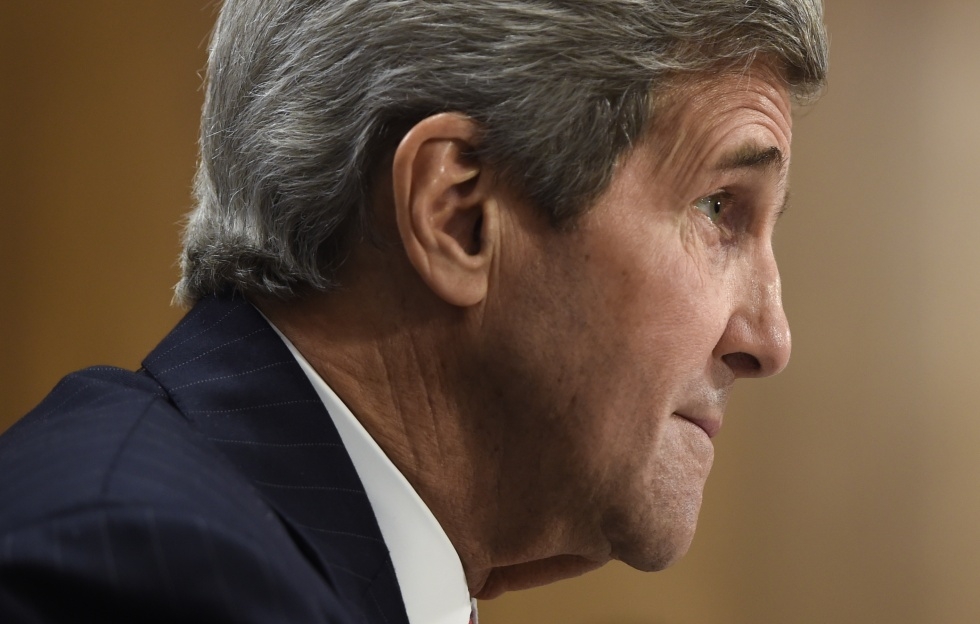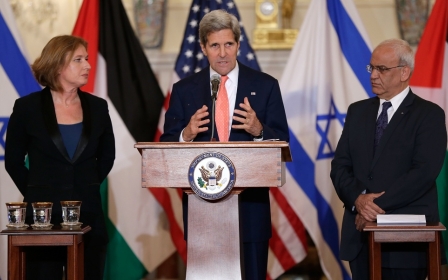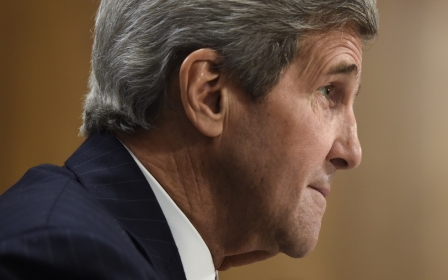Kerry stands alone in Israel-Palestine process

It didn't look good from the start. Israeli Prime Minister Benjamin Netanyahu and Palestinian Authority President Mahmoud Abbas left no one in doubt they were only turning up to keep the Americans happy. Veterans of the Middle East peace business said the prospects for an agreement were less auspicious than at almost any time in two decades. Even US President Barack Obama kept his distance, apparently a sceptic after his bruising dealings with the Israeli prime minister and wanting to avoid the contamination of failure.
Kerry hasn't given up yet. The US can’t afford to declare the two-state solution dead and needs to keep the illusion of negotiations going to avoid confronting the alternatives. But the Israeli right has said there will be no Palestinian state. It is now declaring Kerry’s initiative dead and its demise a “golden opportunity” for Israel to impose its own solution on the Arabs by annexing half of the West Bank.
On the other side, pro-Palestinian activists, who see the future as a single country of all the Jews and Arabs inside Israel and the occupied territories, say a unified state is a step closer. The growing international boycott movement against Israel is predicting a surge in support.
But if Kerry's efforts were indeed doomed from the start, where were the seeds of failure sown? Some fault lies with the US secretary of state himself: He made mistakes such as appointing a team of negotiators with a track record of support for Israel.
Josh Ruebner, author of ‘Shattered Hopes; Obama’s failure to broker Israeli-Palestinian peace’, regards Kerry’s efforts as “doomed from the beginning” and said they “really had a very very miniscule chance of succeeding”.
New MEE newsletter: Jerusalem Dispatch
Sign up to get the latest insights and analysis on Israel-Palestine, alongside Turkey Unpacked and other MEE newsletters
Ruebner blames Kerry for a negotiating team which, like those before it, was “primarily made up of pro-Israel ideologues and people who worked professionally for the Israel lobby before joining the US government”. He said this policy caused the Americans to come to the talks with a mind-set and blueprint for agreement that had little chance of winning Palestinian support.
“What Kerry and Israel were putting on the table as an offer to the Palestinians was not a state,” he said. “It was a non-sovereign entity that would be under the complete control and domination of Israel with all of the major settlement blocks annexed to Israel, with Israel maintaining its infrastructure of military occupation.” Ruebner, however, concluded that the principal reason the talks went nowhere was America’s failure to halt Israel’s continuing colonisation of Palestinian land with the provocative expansion of Jewish settlements.
Kerry recognised this and in an appearance in front of the Senate Foreign Relations Committee, accused Israel of precipitating the negotiations collapse by announcing plans to construct hundreds more settler homes. Throughout the talks, Netanyahu’s government has repeated such announcements, totalling thousands of new housing units, in what looked increasingly like attempts to provoke the Palestinians and sabotage the negotiations.
But if settlement expansion was a clear demonstration of Israel’s bad faith, then the greater failure on the US side belongs not with Kerry, but the White House.
Obama came to power thinking he would be the president to establish a Palestinian state. There were plenty of people around him determined to overcome Netanyahu’s obstructionism. The popular mantra had it that no Israeli prime minister would dare defy a determined US president. The Israeli public would not let him.
With Obama it turned out to be different. At their first White House meeting in 2009, the US president demanded to the Israeli prime minister agree a halt to all settlement construction. In unusual defiance of the White House, Netanyahu refused, publicly humiliating Obama and later making a very public put-down by lecturing him on Jewish history.
Israeli public opinion had shifted too. Obama’s speech in Cairo in July 2009 promising the Arab world a “new beginning” was read by many Israelis as evidence that the US president was not to be trusted. Obama was forced to decide whether it was worth the fight. The pro-Israel lobby rallied the US Congress against the White House, getting even Democrats to sign on to the accusation that Obama was endangering Israel’s security. The president decided not to sacrifice his domestic agenda, including health care reform, over the Middle East, and backed down.
Two years later, Netanyahu again spurned Obama by challenging the president’s reiteration that a sovereign Palestinian state should be founded on the basis of the 1967 borders with land swaps and an Israeli military withdrawal. The Israeli prime minister described those borders as “indefensible” and insisted that the Israeli military would remain firmly planted inside any Palestinian state.
Netanyahu wasn’t just challenging the accepted basis of two decades of negotiation, he was openly dismissing the US president as all but irrelevant in the process. Obama retreated.
When Kerry launched his initiative last year, the president appeared to be a little gun shy. Critics said the Israelis picked up that he was not seen to be fore square behind his secretary of state.
Former US president Jimmy Carter, who brokered the Israel-Egypt peace treaty in 1979, last week took a swipe at Obama by praising Kerry’s effort and saying he "has had a very difficult time operating pretty much on his own”.
"I know from experience that the best way to have the United States be a mediator is for the president himself to be deeply involved,” he told Time Magazine in an interview published last week.
At the beginning of the talks, Kerry warned the parties that they had 18 months to make peace before the window on a two state solution closed. The US secretary of state appears genuinely desperate to make the talks work. So much so that Israel’s defence minister, Moshe Ya’alon, derided him as “messianic” about the peace process earlier this year.
Aaron David Miller, a Middle East peace negotiator in three US administrations, wrote recently in the New Republic that the process will go on but without much prospect of reaching an agreement. Miller questioned whether Obama “had Kerry’s back”, saying that the Arab-Israeli peace process is not considered a presidential priority or a vital US national interest. Kerry is instead “managing the president’s headache” in the Holy Land. “I’m not sure Barack Obama cares enough about the issue to not just get mad at Israel, but to do something about it,” Miller added.
- Chris McGreal is a former correspondent for the Guardian in Washington, Jerusalem and Johannesburg. He now reports from the US. He has won several awards including the Martha Gellhorn prize, the James Cameron award and Amnesty International press reporter of the year.
This views expressed in this article belong to the author and do not necessarily reflect the editorial policy of Middle East Eye.
(Photo credit: AFP)
Middle East Eye delivers independent and unrivalled coverage and analysis of the Middle East, North Africa and beyond. To learn more about republishing this content and the associated fees, please fill out this form. More about MEE can be found here.




